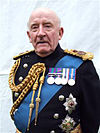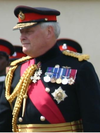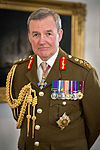Chief of the Defence Staff (United Kingdom)
| Chief of the Defence Staff | |
|---|---|
 | |
 Flag of the Chief of the Defence Staff | |
since 11 June 2018 | |
| Ministry of Defence | |
| Member of | Defence Council Chiefs of Staff Committee |
| Reports to | Secretary of State for Defence |
| Nominator | Defence Secretary |
| Appointer | The Monarch[1] on advice of the Prime Minister |
| Formation | 1 January 1959 |
| First holder | Marshal of the RAF Sir William Dickson |
| Deputy | Vice-Chief of the Defence Staff |
| Website | www |
The Chief of the Defence Staff (CDS) is the professional head of the British Armed Forces and the most senior uniformed military adviser to the Secretary of State for Defence and the Prime Minister. The Chief of the Defence Staff is based at the Ministry of Defence and works alongside the Permanent Under Secretary, the Ministry's senior civil servant. The Chief of the Defence Staff is the British equivalent position of what in NATO and the European Union is known as the Chief of Defence.
Constitutionally, the Sovereign is the de jure Commander-in-Chief of the Armed Forces. However, in practice, the British Government de facto exercises the royal prerogative and provides direction of the Armed Forces through the Ministry of Defence's Defence Council of which the Chief of the Defence Staff is a member.
The current Chief of the Defence Staff is General Sir Nick Carter, who succeeded Air Chief Marshal Sir Stuart Peach in June 2018. Chiefs of the Defence Staff are appointed on the recommendation of the Secretary of State for Defence to the Prime Minister before being approved by the Queen.[1][2]
Supporting and associated posts
The CDS is supported by a deputy, the Vice-Chief of the Defence Staff, who since 1997 (when the CDS post was downgraded) has been of equivalent rank but is ordinarily from a different service to the CDS. There are also several Deputy Chief of the Defence Staff (DCDS) posts who support the VCDS. As of 2015 these are:[3]
- Deputy Chief of Defence Staff (Military Strategy & Operations) (DCDS (MSO))
- Chief of Defence People (CDP)
- Deputy Chief of Defence Staff for Military Capability (DCDS (Mil Cap))
The CDS maintains a close working relationship with the Ministry of Defence's Permanent Under Secretary, who is the Ministry's senior civil servant, and they both report directly to the Secretary of State for Defence. The CDS focusses on military operations and strategy while the Permanent Under Secretary's remit concerns administrative and financial policy.
History of the post
The post was created in 1959 to reflect the new concept of joint operations that had come to the fore in the Second World War. The first incumbent was Marshal of the RAF Sir William Dickson. Prior to the creation of the post, he had served as the chairman of the Chiefs of Staff Committee, from 1956 onwards. Before 1956, although no permanent post of chairman existed, the three service chiefs took it in turn to act as chairman at meetings. From the post's inception until the mid-to-late 1970s, CDS appointments were granted on a strict rotational basis between the three services. The first break in rotational order was precipitated by the death of Marshal of the RAF Sir Andrew Humphrey. During the 1980s, two Royal Navy officers held the post covering a combined period of six years.
From the creation of the post until 1997, the Chief of the Defence Staff was appointed to the highest rank in the respective branch of the British armed forces to which he belonged, being an admiral of the Fleet, a field marshal or marshal of the Royal Air Force, (NATO rank code OF-10). However, with the post-Cold War reduction in the manpower strength of the British Armed Forces and the additional reasoning that no new 5-star appointments are to be made in peacetime, since 1997 the Chief of the Defence Staff has kept the rank of admiral, general or air chief marshal, (NATO OF-9), which he invariably already holds. However, during the 2010s Guthrie, Boyce, Walker and Stirrup were honorarily promoted to their respective services' senior ranks, sometime after they had each stepped down as CDS. Although there is no policy against a Royal Marines officer being appointed, few officers in the Corps attain a high enough rank to be considered for the post. However, in 2016, Gordon Messenger was promoted to the four star rank of general and appointed as Vice-Chief of the Defence Staff.
List of Chiefs of the Defence Staff (1959–present)
| No. | Portrait | Chief of the Defence Staff | Took office | Left office | Time in office | Defence branch | Ref. |
|---|---|---|---|---|---|---|---|
| 1 | Marshal of the Royal Air Force Sir William Dickson GCB, KBE, DSO, AFC (1898–1987) | 1 January 1959 | 12 July 1959 | 192 days | [4] | ||
| 2 | Admiral of the Fleet The Earl Mountbatten of Burma KG, GCB, GCSI, GCIE, GCVO, DSO (1900–1979) | 13 July 1959 | 15 July 1965 | 6 years, 2 days | [5] | ||
| 3 | Field Marshal Sir Richard Hull GCB, DSO (1907–1989) | 16 July 1965 | 4 August 1967 | 2 years, 19 days | [6] | ||
| 4 | Marshal of the Royal Air Force Sir Charles Elworthy GCB, CBE, DSO, LVO, DFC, AFC (1911–1993) | 4 August 1967 | 8 April 1971 | 3 years, 247 days | [7][8] | ||
| 5 | Admiral of the Fleet Sir Peter Hill-Norton GCB (1915–2004) | 9 April 1971 | 21 October 1973 | 2 years, 195 days | [9] | ||
| 6 | Field Marshal Sir Michael Carver GCB, CBE, DSO & Bar, MC (1915–2001) | 21 October 1973 | 24 October 1976 | 3 years, 3 days | [10][11] | ||
| 7 | Marshal of the Royal Air Force Sir Andrew Humphrey GCB, OBE, DFC, AFC & Two Bars (1921–1977) | 24 October 1976 | 24 January 1977 † | 92 days | [12] | ||
| - | Admiral of the Fleet Sir Edward Ashmore GCB, DSC (1919–2016) Acting | 9 February 1977 | 30 August 1977 | 202 days | [13] | ||
| 8 | Marshal of the Royal Air Force Sir Neil Cameron GCB, CBE, DSO, DFC (1920–1985) | 31 August 1977 | 31 August 1979 | 2 years, 0 days | [14][15] | ||
| 9 | Admiral of the Fleet Sir Terence Lewin GCB, LVO, DSC (1920–1999) | 1 September 1979 | 30 September 1982 | 3 years, 29 days | [16] | ||
| 10 | Field Marshal Sir Edwin Bramall GCB, OBE, MC (born 1923) | 1 October 1982 | 31 October 1985 | 3 years, 30 days | [17] | ||
| 11 | Admiral of the Fleet Sir John Fieldhouse GCB, GBE (1928–1992) | 1 November 1985 | 9 December 1988 | 3 years, 38 days | [18] | ||
| 12 | Marshal of the Royal Air Force Sir David Craig GCB, OBE (born 1929) | 9 December 1988 | 1 April 1991 | 2 years, 113 days | [19] | ||
| 13 | Field Marshal Sir Richard Vincent GBE, KCB, DSO (1931–2018) | 2 April 1991 | 31 December 1992 | 1 year, 273 days | [20] | ||
| 14 | Marshal of the Royal Air Force Sir Peter Harding GCB (born 1933) | 31 December 1992 | 13 March 1994 | 1 year, 72 days | [21] | ||
| 15 | Field Marshal Sir Peter Inge GCB (born 1935) | 15 March 1994 | 1 April 1997 | 3 years, 17 days | [22] | ||
| 16 | General Sir Charles Guthrie GCB, LVO, OBE (born 1938) | 2 April 1997 | 15 February 2001 | 3 years, 319 days | [23] | ||
| 17 | Admiral Sir Michael Boyce GCB, OBE (born 1943) | 16 February 2001 | 2 May 2003 | 2 years, 75 days | [24] | ||
| 18 | General Sir Michael Walker GCB, CMG, CBE (born 1944) | 2 May 2003 | 28 April 2006 | 2 years, 361 days | [25] | ||
| 19 | Air Chief Marshal Sir Graham Stirrup GCB, AFC (born 1949) | 28 April 2006 | 29 October 2010 | 4 years, 184 days | [26] | ||
| 20 | General Sir David Richards GCB, CBE, DSO (born 1952) | 29 October 2010 | 18 July 2013 | 2 years, 271 days | [27][28] | ||
| 21 | General Sir Nick Houghton GCB, CBE, ADC (born 1954) | 18 July 2013 | 14 July 2016 | 2 years, 362 days | [29][30] | ||
| 22 | Air Chief Marshal Sir Stuart Peach GBE, KCB, ADC, DL (born 1956) | 14 July 2016 | 11 June 2018 | 1 year, 332 days | [31] | ||
| 23 | General Sir Nicholas Carter KCB, CBE, DSO, ADC Gen (born 1959) | 11 June 2018 | Incumbent | 6 years, 145 days | [32] |
Living former Chiefs of the Defence Staff
| Rank | Name | Born |
|---|---|---|
| Field Marshal | The Lord Bramall KG, GCB, OBE, MC, JP, DL | 18 December 1923 (age 100) |
| Marshal of the Royal Air Force | The Lord Craig of Radley GCB, OBE | 17 September 1929 (age 95) |
| Marshal of the Royal Air Force | Sir Peter Harding GCB | 2 December 1933 (age 90) |
| Field Marshal | The Lord Inge KG, GCB, PC, DL | 5 August 1935 (age 89) |
| Field Marshal | The Lord Guthrie of Craigiebank GCB, LVO, OBE, DL | 17 November 1938 (age 85) |
| Admiral of the Fleet | The Lord Boyce KG, GCB, OBE, DL | 2 April 1943 (age 81) |
| Field Marshal | The Lord Walker of Aldringham GCB, CMG, CBE, DL | 7 July 1944 (age 80) |
| Marshal of the Royal Air Force | The Lord Stirrup KG, GCB, AFC | 4 December 1949 (age 74) |
| General | The Lord Richards of Herstmonceux GCB, CBE, DSO, DL | 4 March 1952 (age 72) |
| General | The Lord Houghton of Richmond GCB, CBE, ADC Gen | 18 October 1954 (age 70) |
| Air Chief Marshal | Sir Stuart Peach GBE, KCB, ADC, DL | 22 February 1956 (age 68) |
Timeline
Unable to compile EasyTimeline input:
Timeline generation failed: 1 error found
Line 85: bar:Carter from: 11/06/2018 till: 03/11/2024 color:BA text:Carter
- Plotdata attribute 'till' invalid.
Date '03/11/2024' not within range as specified by command Period.
Peerage
Customarily, former Chiefs of Defence Staff receive a life peerage on retirement, sitting in the House of Lords as non-political crossbench peers. Their appointment is recommended not via the House of Lords Appointments Commission as is normal procedure, but is instead nominated directly to Her Majesty The Queen by the Prime Minister, who elects to nominate "a limited number of distinguished public servants" on retirement for a peerage. Sir Jock Stirrup was introduced to the House of Lords on 1 February 2010 as Baron Stirrup of Marylebone in the City of Westminster.[27][33][34]
References
- ^ a b Departmental Resource Accounts 2006-7 Ministry of Defence
- ^ Farmer, Ben (21 January 2016). "Senior RAF officer who commanded Britain's intervention in Libya will be next Chief of the Defence Staff". The Telegraph. Retrieved 21 January 2016.
- ^ "How Defence Works". Ministry of Defence. Retrieved 17 June 2018.
- ^ Barrass, Malcolm (25 September 2007). "Marshal of the RAF Sir William Dickson". Air of Authority – A History of RAF Organisation. Retrieved 28 April 2009.
- ^ Heathcote (2002), p. 189
- ^ "No. 43712". The London Gazette (Supplement). 13 July 1965. p. 6717.
- ^ Barrass, Malcolm (16 June 2007). "Marshal of the RAF The Lord Elworthy of Timaru". Air of Authority – A History of RAF Organisation. Retrieved 7 March 2010.
- ^ "No. 44376". The London Gazette (Supplement). 28 July 1967. p. 8445.
- ^ "No. 45168". The London Gazette (Supplement). 7 August 1970. p. 8853.
- ^ "No. 46109". The London Gazette (Supplement). 23 October 1973. p. 12551.
- ^ "No. 47050". The London Gazette (Supplement). 25 October 1976. p. 14418.
- ^ "No. 47050". The London Gazette (Supplement). 25 October 1976. p. 14421.
- ^ Heathcote (2002), p. 16
- ^ Barrass, Malcolm (16 June 2007). "Marshal of the RAF Lord Cameron of Balhousie". Air of Authority – A History of RAF Organisation. Retrieved 30 May 2010.
- ^ "No. 47311". The London Gazette (Supplement). 26 August 1977. p. 11141.
- ^ Heathcote (2002), p. 159
- ^ "No. 49142". The London Gazette (Supplement). 18 October 1982. p. 13571.
- ^ Heathcote (2002), p. 78
- ^ "No. 51550". The London Gazette (Supplement). 5 December 1988. p. 13684.
- ^ "No. 52489". The London Gazette (Supplement). 28 March 1991. p. 5083.
- ^ "No. 53184". The London Gazette (Supplement). 25 January 1993. p. 1376.
- ^ "No. 53645". The London Gazette (Supplement). 18 April 1994. p. 5799.
- ^ "No. 54726". The London Gazette (Supplement). 7 April 1997. p. 4170.
- ^ MoD announces new Chief of Defence Staff Archived 2011-07-26 at the Wayback Machine
- ^ "No. 56992". The London Gazette (Supplement). 8 July 2003. p. 8463.
- ^ SBAC[permanent dead link] RAF Chief becomes the new Chief of Defence Staff
- ^ a b "Outgoing CDS to receive peerage". Downing Street. 27 October 2010.
- ^ "No. 59593". The London Gazette (Supplement). 2 November 2010. p. 21039.
- ^ "No. 60575". The London Gazette (Supplement). 23 July 2013. p. 14487.
- ^ "Sir David Richards to become a lord – after overseeing the sacking of 20,000 troops". 13 July 2013. Retrieved 14 July 2013.
- ^ "Chief of the Defence Staff Sir Stuart Peach GBE KCB ADC DL". 14 July 2016. Retrieved 14 July 2016.
- ^ "No. 62321". The London Gazette (Supplement). 11 June 2018. p. 10419.
- ^ House of Lords Business, February 1, 2011
- ^ "Gen Sir David Richards new head of British armed forces". BBC News. 14 July 2010.
Sources
- Heathcote, Tony (2002). The British Admirals of the Fleet 1734–1995. Havertown: Pen & Sword. ISBN 0-85052-835-6.
{{cite book}}: Invalid|ref=harv(help)

















